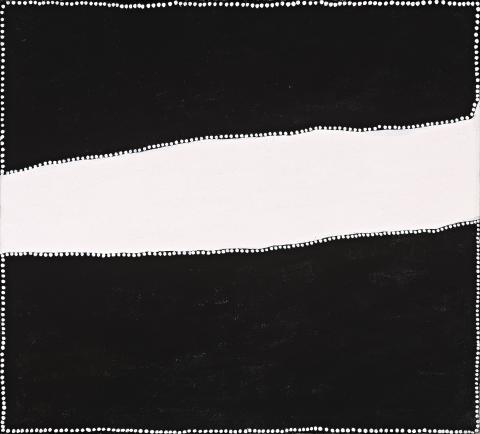TWENTY MILE, 1999
PADDY NYUNKUNY BEDFORD
ochres and pigments with synthetic binder on canvas
122.0 x 135.0 cm
bears inscription verso: artist’s name, artist’s initials, title, date and Jirrawun Aboriginal Arts cat. PB 5 99.46
Jirrawun Aboriginal Arts Corporation, Kununurra
Private collection, Sydney
Phillips de Pury, Sydney, 24 July 2000, lot 121
Private collection, Sydney
Storer, R., Paddy Bedford, Museum of Contemporary Art, Sydney, 2006, p. 146 (illus.) (with Jirrawun Aboriginal Arts cat. PB 5 1999.46)
During the 2000 Sydney Olympics, Twenty Mile, 1999 was featured on the cover of Hemisphere the United Airlines in-flight magazine, September 2000, front cover and p. 10
Paddy Bedford is one of Australia's most esteemed artists. His powerful and evocative paintings draw on rich traditions while his consistent innovations have resulted in a diverse and dynamic body of work. Characterised by their bold forms, sinuous lines and complex spatial play, Bedford's paintings reveal a sheer love of painting, inspired by the dramatic and distinctive landscapes of his country in the East Kimberley region of Western Australia, and the stories of his people.1
Producing his first works in 1997, aged 75, Bedford soon became recognised as an important artist and innovator through his unique depictions of East Kimberley history, evolving the artistic tradition forged earlier by Rover Thomas and Paddy Tjaminji.
Crafting his own representations of country, Bedford’s formal language is characterised by a symbiotic relationship between bold forms and an elegance and balance in composition. His painting evokes rocky escarpments, rivers and other amorphous features of the Kimberley landscape whilst at the same time containing a learned and poetic knowledge of the land and its creation stories.
Depicting the country of Twenty Mile (Girlingmanji), a bore site southwest of Bedford Downs Homestead close to the Springvale-Landsdown road, the site is characterised by black soil plains running out to the base of the Durack Ranges. Spring Creek runs through this place and it is close to the old Bedford road. Notably, Bedford's grandfather was tragically killed during a fight in this country. Catalogued as painting PB 5 1999.46 in Bedford's chronological index of works, this painting dates from 1999, the second year of the artist's painting career and exemplifies Bedford's move away from the more familiar style of the earlier east Kimberley painters. With his elimination of the ochre palette and introduction of starkly contrasting black and white, the interplay between positive and negative space is highlighted and the form becomes dominant.
It is important to note that the complex narratives in Bedford’s works intertwine family stories, historical events and a deep connection to his country, often masked by the simple, bold starkness of his technique. As curator Russell Storer observes, ‘his paintings articulate a complex dialectic between modern materials and traditional pictorial conventions, contemporary experience and ancient belief systems.’2
1. Macgregor, E.A., 'Foreword', in Storer, R., Paddy Bedford, Museum of Contemporary Art, Sydney, 2006, p. 7
2. Storer, R., Paddy Bedford, Museum of Contemporary Art, Sydney, 2006 p. 11
CRISPIN GUTTERIDGE
